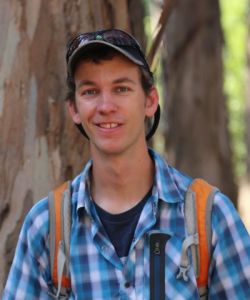
What sparked your interest in science?
My passion for science is derived from a couple of sources. The first is an innate curiosity of nature and the environment. I attribute much of this to a childhood where the exploration of rural Minnesota backwoods and rugged peaks of Montana was always promoted. Another spark that kindles my pursuit of science comes from phenomenal and passionate mentors; whether they are teachers, advisers, family, or classmates, I would not be pursuing science without finding inspiration in their drive and enthusiasm.
What attracted you to UC Berkeley?
Around every corner and down every hall there is exceptional research going on at UC-Berkeley. With this in mind, it is hard not to be attracted to this research mecca. I knew that given the depth and breadth of the MCB program specifically, I could find a thesis lab that was exciting and fun in whatever field I decided to pursue in graduate school.
What are you currently working on in the lab?
In the lab of Eva Nogales, I use electron cryo-microscopy to enlighten our understanding of the kinetochore complex. The kinetochore is responsible for tethering chromosomes to microtubules during cell division and ensuring proper segregation of sister chromatids. Specifically, I am reconstituting and visualizing the kinetochore piece-by-piece in order to understand the structural and mechanistic cues that drive this fundamental cellular process.
Describe your ultimate dream/goal for your future.
I'm excited to see what the future holds. My dreams include a return to the wilderness of Montana. There are a couple of fantastic research opportunities there, including Rocky Mountain National Lab, where I would love to snag a job.
When I'm not in the lab, I can be found...
Trail-running, biking, backpacking, skiing, and fishing in the mountains.
If you could go back in time and give yourself a piece of advice during your first year in graduate school, what would you say?
I recommend attending as many talks as possible in a variety of fields-- and to take each talk as an exercise in formulating questions and ideas. It's all to easy to become a passive listener during lectures, but forming thoughtful questions is excellent training and will greatly benefit your own scientific inquiries.